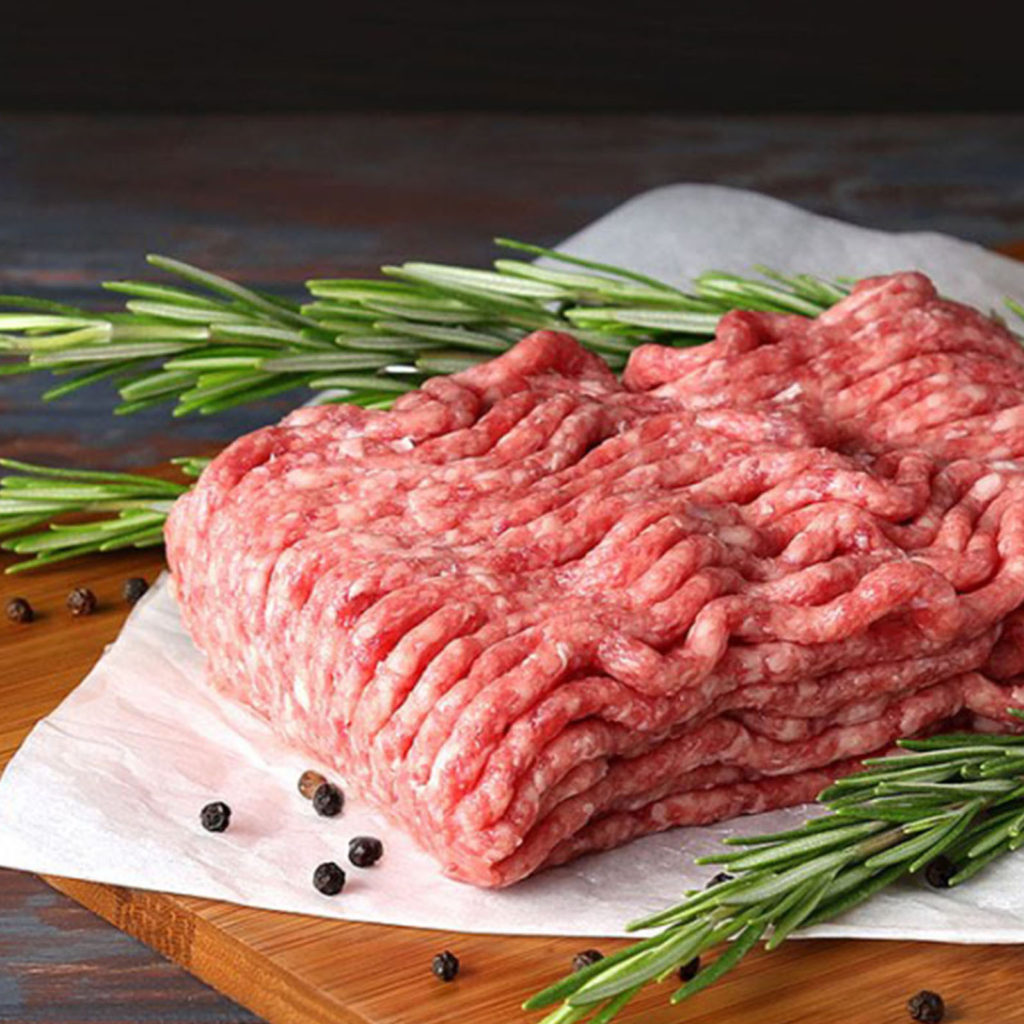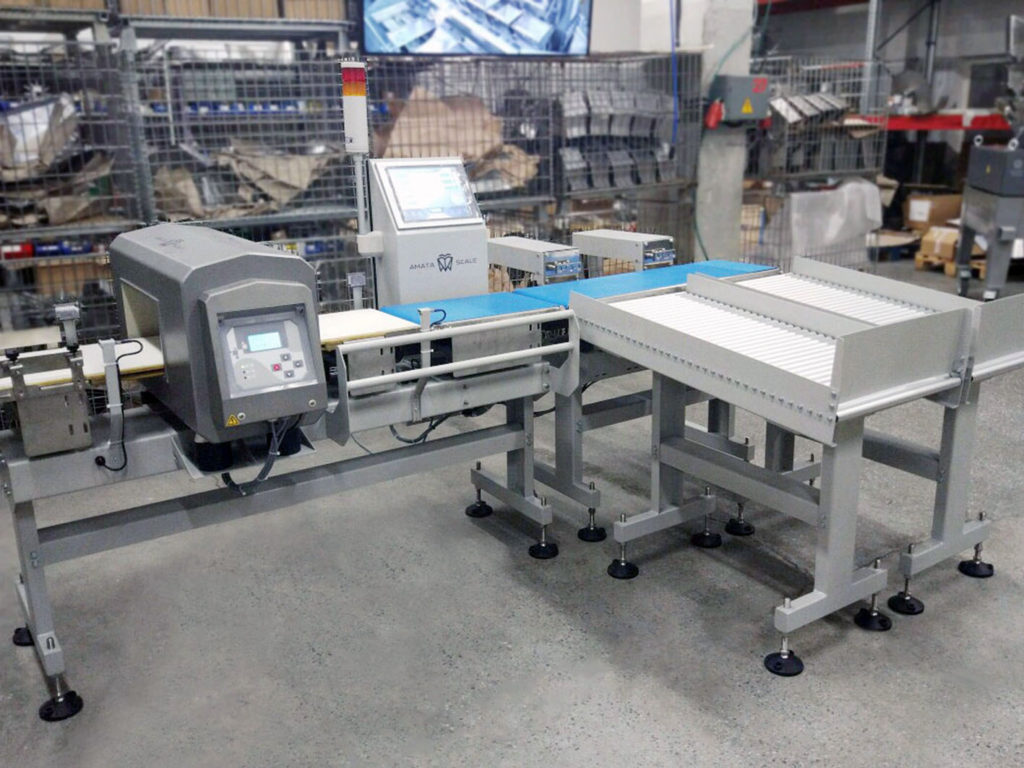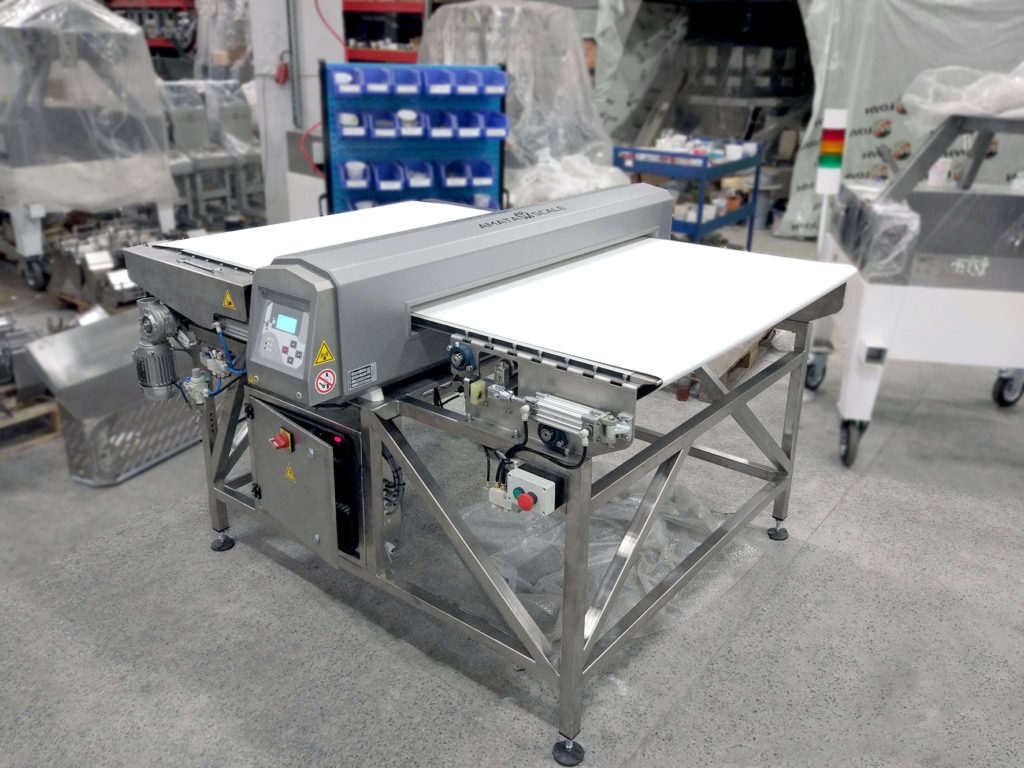
Today we will talk about quality control, especially about metal detectors. What is this equipment, why is it necessary and is it really necessary at all. At first sight metal detectors seem to be quite complex and incomprehensible to use, and often unnecessary in the production process. Therefore, in this article we will collect answers to all the basic questions and describe in detail about such an interesting kind of quality control equipment.
WHAT IS A METAL DETECTOR?
Metal detector is a special equipment designed to detect foreign inclusions from ferrous or non-iron metals and alloys in controlled products.
The most common conveyor metal detectors are such as AMATA MD. They are a horizontal conveyor on which a metal detector is installed. The product, moving along the conveyor, passes through the detector frame, which automatically scans the product. In case of detection of metallic inclusions, the light and sound alarm is triggered, which is included in the basic package of AMATA metal detectors. Optionally, each AMATA metal detector can be equipped with a reject, which is designed to remove the product with metal particles from the product line, and a device for storing defective products (Unit for Rejects Accumulation).
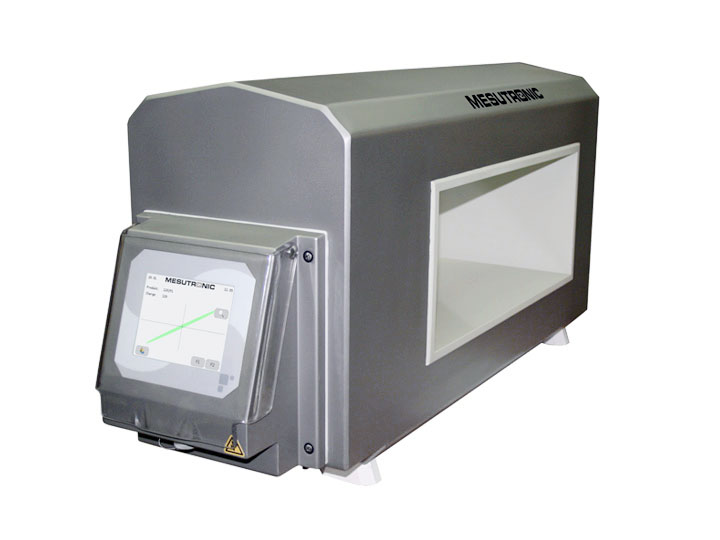
Conveyor Metal Detector MESUTRONIC 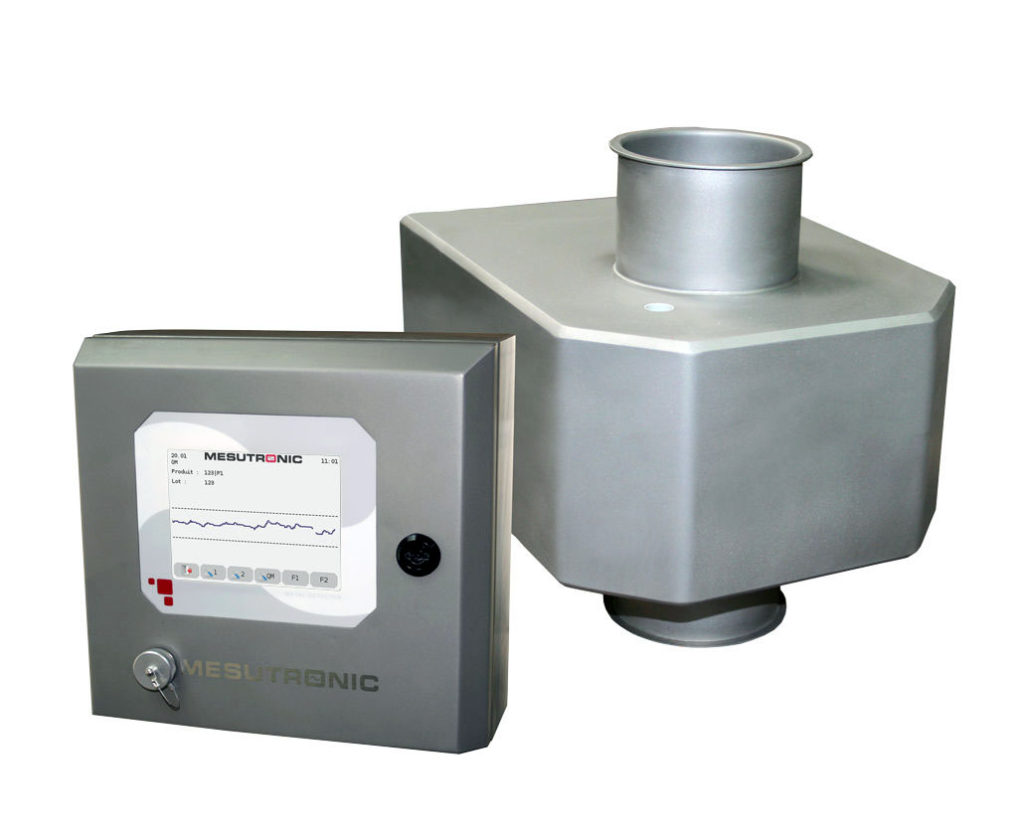
Flow-through Metal Detector
In addition to conveyor metal detectors, AMATA SCALE also supplies flow-through metal detectors. This is a special equipment that scans the product for the presence of metal particles in the stream. Such devices are special-shaped metal detectors, which can be installed, for example, under a combination dispenser before the packaging machine. In this case a dose scan of the product occurs at the moment of unloading the multiheads during the transfer of the product to the receiving hopper of the packaging machine. This type of metal detectors is particularly relevant for bulk products intended for packaging in metallized packaging.
WHY DO METAL DETECTORS NEED?
For many years of work in the field of production of packing and packaging equipment, we can say with a large degree of confidence that foreign objects enter products very often. Since practically all the components of the production equipment consist of metal elements, the probability of metal particles entering the product is extremely high.
Recently there are more and more cases when fragments of production equipment or other foreign objects fall into products. They pose the greatest danger when they get into food: buns, bread, cottage cheese, sausage, minced meat etc. The presence in the production of metal detectors allows to exclude such cases. Therefore, we believe that manufacturers of food products are the main potential consumers of our metal detectors.
In general, metal detectors benefit manufacturing companies in two main areas:
- Quality control of raw materials. If the metal detector is installed at the very beginning of the production line, then the enterprise has the opportunity to promptly reject non-conforming raw materials. Firstly, such a rapid response allows identifying unscrupulous suppliers at the stage of acceptance of raw materials and to exclude further production of low-quality products. Secondly, the detection of metallic inclusions in the early stages of the technological cycle makes it possible to avoid equipment breakdowns in the technological line. This is especially important for equipment such as mixers, meat grinders, dough mixers, etc.
- Quality control of the final product. In order to be sure that during the manufacturing process no metal particles get into the final product, it is recommended to install a metal detector in the packaging and packing workshop. Indeed, the quality of the final product depends on the health of consumers and the image of the company.
It should be noted that the requirements for food safety have recently become increasingly stringent. Manufacturers working with the network retail segment confirm this fact. Additional inspection of both raw materials and finished product for the presence of metal particles allows this product to be truly safe and comply with the requirements of the Technical Regulations of the Customs Union TR TS 021/2011 “On food safety” and the ISO 22000: 2005 Standard “Food Safety Management Systems and food products”.
WHY DO METAL DETECTORS NEED?
The main parameter of the metal detector is its sensitivity. This is the ability of a metal detector to detect particles of metals and alloys of a certain size in a product.
Many factors influence the sensitivity of metal detectors and their ability to detect various metals:
- Type of metal of foreign inclusions. The maximum effect on the electromagnetic field has a metal that can magnetize. Thus, ferromagnets are detected by the detector easier.
- The composition of the product. Moisture and salt increase electrical conductivity. Accordingly, in saline and wet foods, it is more difficult to detect a metallic inclusion.
- The shape of the product. The most “convenient” form for a metal detector is a ball or a shape close to it. Extruded products are more difficult to detect metallic particles.
- The location of the product on the conveyor belt. As a rule, the most sensitive areas of the metal detector are located along the edges of the frame, that is, in the immediate vicinity of the coils-detectors. The least sensitive zones are located in the center of the frame. Thus, if the product passes close to the perimeter of the frame, the readings of the metal detector will be more accurate.
- The location of the metallic inclusion in the product. As mentioned earlier, the closer to the perimeter of the metal detector frame the metal particle is, the easier it will be to detect it.
- Working conditions. The sensitivity of the metal detector is influenced by magnetic or electric fields created by neighboring equipment, power supply parameters, vibration of the metal detector, dirt and dust on the conveyor belt, sudden changes in ambient temperature, massive metal objects nearby.
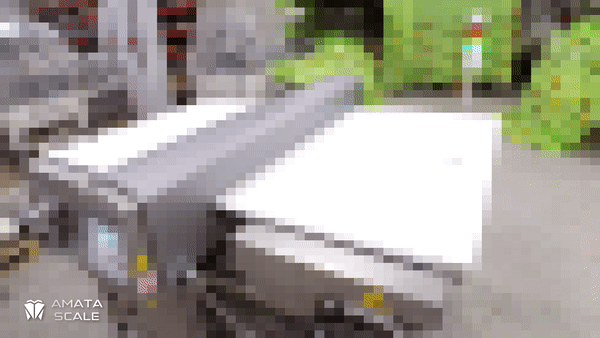
Thus, we can conclude that the metal detector is a complex and highly sensitive equipment. It is necessary to carefully and carefully approach the process of selecting the necessary device, as well as the conditions of its installation and further operation.
WHAT METAL DETECTOR NEEDS FOR ME?
In order to obtain a highly sensitive, stable and reliable system that allows to achieve the required performance and at the same time avoid false rejection and product loss without the need, first of all, it is necessary to carefully and thoroughly work out the issue of selecting a metal detector frame.
The size of the frame depends on the dimensions of the controlled product. For the detector to work optimally, it is necessary that the frame be a certain value larger than the product itself. Among the typical metal detectors AMATA, there are frame options for products with a height of 100 mm or 250 mm. In addition to typical solutions, we also offer our customers an individual selection of the detector frame for a specific product.
In addition to the overall dimensions of the product itself is important. The detector is chosen exclusively for a specific product of the customer, since the physical and chemical properties of the products affect the sensitivity.
Also when selecting a metal detector, it is necessary to take into account and, if necessary, eliminate the orientation effect and the effect of the product, in order to ensure maximum efficiency of the system for detecting foreign metallic inclusions. The individual sensitivity of the system to specific metals is also important.
It should be noted that AMATA metal detectors can be completed with checkweighers — devices for dynamic weight control. This allows you to further improve the quality of the product.
The AMATA SCALE specialists will select the best metal detector for you specifically for your product. We will take into account all the factors, you can be sure that you will get a reliable and highly sensitive system with the required performance.
Contact our managers and learn more about the capabilities of the AMATA quality control equipment:
Tel: +7 (812) 320-42-01
Fax: +7 (812) 329-49-11
E-mail: info@amatascl.com

